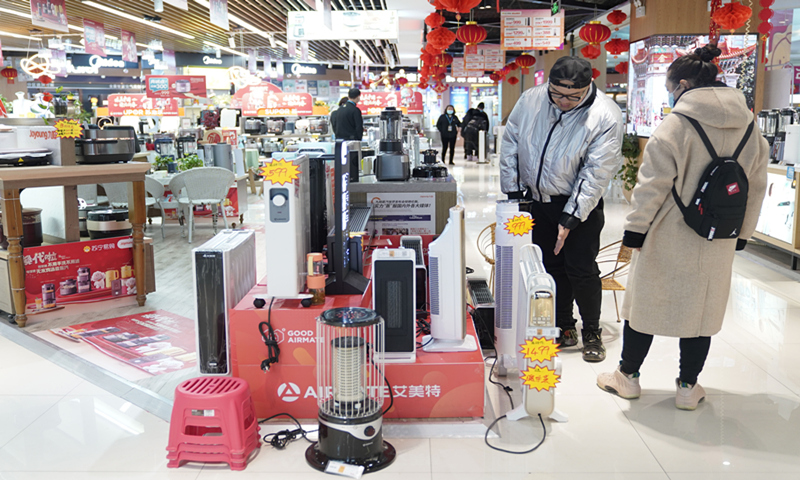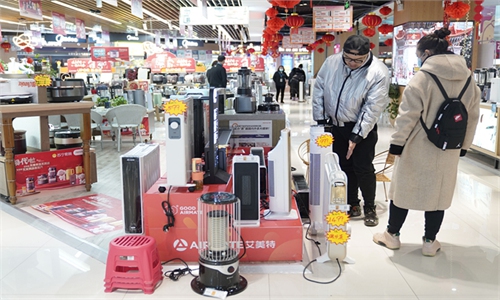Prices of China’s home appliances soar by 10-20% after Spring Festival holiday
US fiscal policy, disruption of microchip supplies contribute to trend

People buy heaters at a store of e-commerce platform Suning in Kunming, Southwest China's Yunnan Province on January 11. Photo: cnsphoto
Home appliance prices in China have risen, since the Spring Festival holiday ended, an unusual development driven by the soaring costs of raw materials such as steel and plastic, the global microchips supply disruption, and even US fiscal policy's impact on the value of the dollar.
Nonetheless, Chinese home appliance makers' export orders have remained largely resilient.
News of record-high appliance prices went viral online and became a trending topic on Sina Weibo, a Twitter-like social media platform. In previous years, home appliance prices often drop after the festival, along with Chinese consumer spending.
Domestic leading home appliance supplier Midea raised prices for refrigerators by 10-15 percent starting from Monday. A number of other brands including Xiaomi and TCL have also adjusted selling prices, media reports said.
Appliance prices have been rising since the beginning of the year. AVC monitoring data show that in January, the average price of a color TV was 4,573 yuan ($706), a year-on-year rise of 22.3 percent, and the average price of an air conditioner was 3,937 yuan, up 3.4 percent from the previous year.
Surging upstream prices for raw materials and processed inputs such as plastic and steel pushed home appliance makers to raise their prices to maintain their gross margins, Michael Qi Yong, general manager at consumer electronics distributor Shenzhen Muchen Technology Co, told the Global Times on Thursday.
The global chip shortage was also a factor, driving up the prices of large household appliances 5-8 percent, Qi said. Companies have been stockpiling chips as a precaution.
Qi's company has increased the export price of one model of Xiaomi TV from $246 last November to $267 now.
Plastic prices are up 15-20 percent and copper is up 30 percent, Hong Shibin, deputy executive director of the marketing committee of the China Household Electrical Appliances Association, told the Global Times on Thursday.
Experts said that US fiscal policy and its impact on the US dollar is a factor in the situation. The US House of Representatives approved a $1.9 trillion economic stimulus package on February 27 in a bid to boost the US' stagnant economy, which has been affected by the pandemic, media reports said.
"People are buying in more strong bulk commodities futures as the price going up against the weakened dollar, causing further prices to rise," said Hong.
An employee surnamed Lan at Hangzhou Boniu Co, which designs websites for e-commerce platform companies, told the Global Times on Thursday that the company has observed higher home appliance prices, with rises ranging from 5-30 percent.
"Some customers have international business. Considering the exchange rate, rising logistics costs and other factors, if the domestic price increases by 15 percent, the international price will actually increase by around 10 percent," said Lan.
However, the website quotation is only a reference, and specific transaction prices often fluctuate, Lan added.
Despite these issues, there's been a limited impact on exports.
Product prices are 15-20 percent higher than before the recent holidays, with big increases for large home appliances such as refrigerators and washing machines, a manager at Yiwu-based Winning Star Electronic Technology in East China's Zhejiang Province surnamed Huang told the Global Times. However, because the company had a large inventory, it hasn't raised export prices, said Huang.
Industry insiders said that rising commodity prices have become a global phenomenon, and although Chinese businesses have adjusted their prices under cost pressures, their export business can be sustained, especially as China has fully resumed production.

